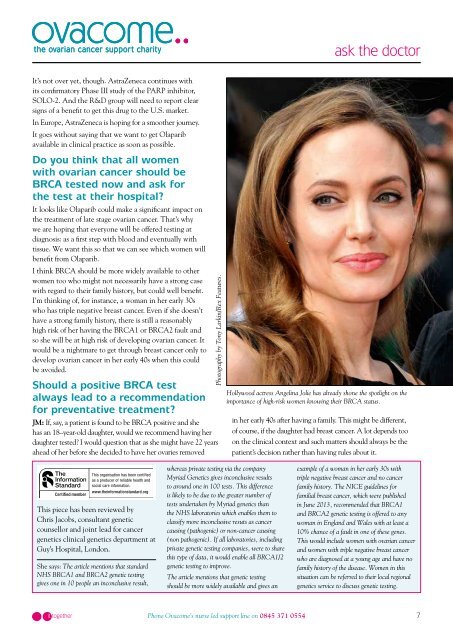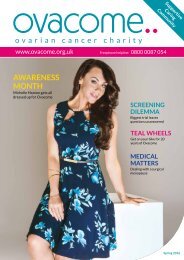Ovacome Summer 2014
Ovacome Summer 2014
Ovacome Summer 2014
Create successful ePaper yourself
Turn your PDF publications into a flip-book with our unique Google optimized e-Paper software.
ask the doctor<br />
It’s not over yet, though. AstraZeneca continues with<br />
its confirmatory Phase III study of the PARP inhibitor,<br />
SOLO-2. And the R&D group will need to report clear<br />
signs of a benefit to get this drug to the U.S. market.<br />
In Europe, AstraZeneca is hoping for a smoother journey.<br />
It goes without saying that we want to get Olaparib<br />
available in clinical practice as soon as possible.<br />
Do you think that all women<br />
with ovarian cancer should be<br />
BRCA tested now and ask for<br />
the test at their hospital?<br />
It looks like Olaparib could make a significant impact on<br />
the treatment of late stage ovarian cancer. That’s why<br />
we are hoping that everyone will be offered testing at<br />
diagnosis: as a first step with blood and eventually with<br />
tissue. We want this so that we can see which women will<br />
benefit from Olaparib.<br />
I think BRCA should be more widely available to other<br />
women too who might not necessarily have a strong case<br />
with regard to their family history, but could well benefit.<br />
I’m thinking of, for instance, a woman in her early 30s<br />
who has triple negative breast cancer. Even if she doesn’t<br />
have a strong family history, there is still a reasonably<br />
high risk of her having the BRCA1 or BRCA2 fault and<br />
so she will be at high risk of developing ovarian cancer. It<br />
would be a nightmare to get through breast cancer only to<br />
develop ovarian cancer in her early 40s when this could<br />
be avoided.<br />
Should a positive BRCA test<br />
always lead to a recommendation<br />
for preventative treatment?<br />
JM: If, say, a patient is found to be BRCA positive and she<br />
has an 18–year-old daughter, would we recommend having her<br />
daughter tested? I would question that as she might have 22 years<br />
ahead of her before she decided to have her ovaries removed<br />
Photography by Tony Larkin/Rex Features.<br />
Hollywood actress Angelina Jolie has already shone the spotlight on the<br />
importance of high-risk women knowing their BRCA status.<br />
in her early 40s after having a family. This might be different,<br />
of course, if the daughter had breast cancer. A lot depends too<br />
on the clinical context and such matters should always be the<br />
patient’s decision rather than having rules about it.<br />
This piece has been reviewed by<br />
Chris Jacobs, consultant genetic<br />
counsellor and joint lead for cancer<br />
genetics clinical genetics department at<br />
Guy’s Hospital, London.<br />
She says: The article mentions that standard<br />
NHS BRCA1 and BRCA2 genetic testing<br />
gives one in 10 people an inconclusive result,<br />
whereas private testing via the company<br />
Myriad Genetics gives inconclusive results<br />
to around one in 100 tests. This difference<br />
is likely to be due to the greater number of<br />
tests undertaken by Myriad genetics than<br />
the NHS laboratories which enables them to<br />
classify more inconclusive resuts as cancer<br />
causing (pathogenic) or non-cancer causing<br />
(non pathogenic). If all laboratories, including<br />
private genetic testing companies, were to share<br />
this type of data, it would enable all BRCA1/2<br />
genetic testing to improve.<br />
The article mentions that genetic testing<br />
should be more widely available and gives an<br />
example of a woman in her early 30s with<br />
triple negative breast cancer and no cancer<br />
family history. The NICE guidelines for<br />
familial breast cancer, which were published<br />
in June 2013, recommended that BRCA1<br />
and BRCA2 genetic testing is offered to any<br />
woman in England and Wales with at least a<br />
10% chance of a fault in one of these genes.<br />
This would include women with ovarian cancer<br />
and women with triple negative breast cancer<br />
who are diagnosed at a young age and have no<br />
family history of the disease. Women in this<br />
situation can be referred to their local regional<br />
genetics service to discuss genetic testing.<br />
it together<br />
Phone <strong>Ovacome</strong>’s nurse led support line on 0845 371 0554 7



